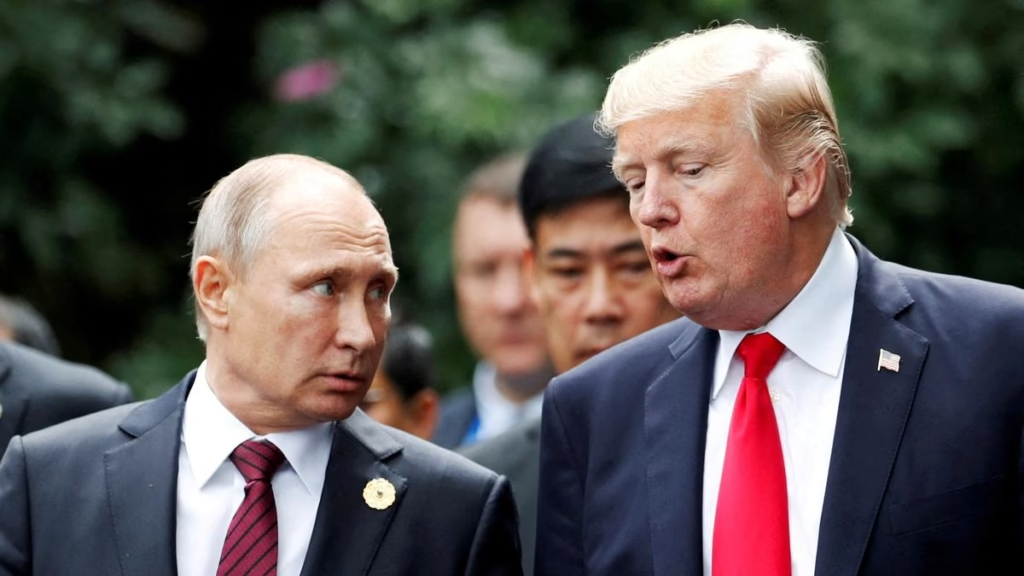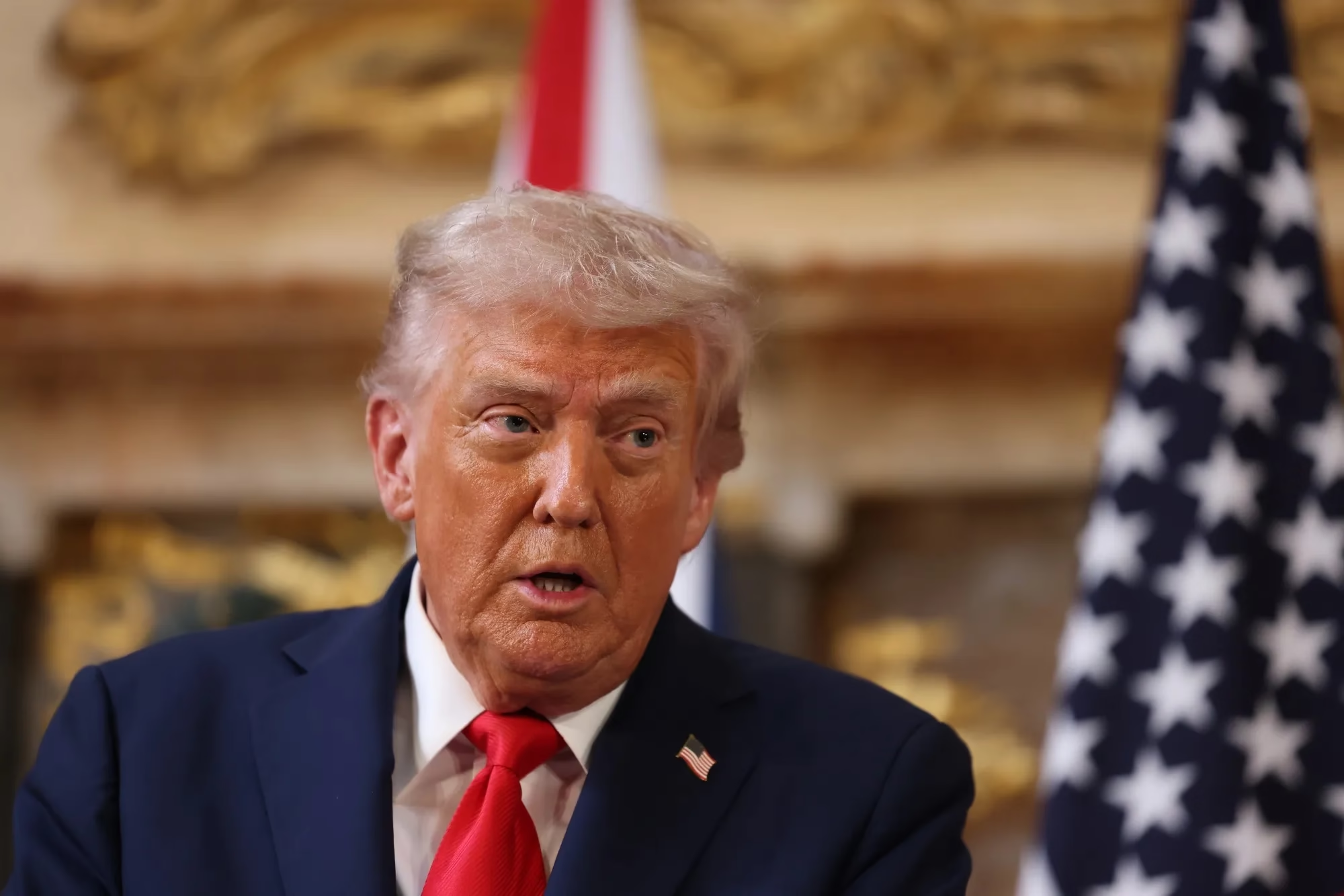
Former U.S. President Donald Trump has once again stirred global debate on the war in Ukraine. In a sharp remark during a joint press conference in London with U.K. Prime Minister Keir Starmer, Trump argued that Russian President Vladimir Putin would be forced to settle and drop out of the Ukraine war if global oil prices came down and Western nations stopped buying Russian energy.
Trump’s statement, direct and characteristically bold, tied the future of the Ukraine conflict to the economics of global energy markets. He insisted that the Kremlin’s ability to sustain the war depends heavily on revenue from oil and gas exports — a lifeline he believes the West should cut off to bring the war closer to an end.
Trump’s Message: “Lower Oil Prices Will Force Putin Out”
Speaking to reporters, Trump said: “Very simply, if the price of oil comes down, Putin is going to drop out. He’s going to have no choice but to settle.”
The remark underscores his long-standing view that economics, rather than military escalation, is the key to ending the Russia–Ukraine conflict. Trump criticized European nations for continuing to buy Russian oil, saying their purchases undermine Western unity and give Moscow the resources it needs to prolong the war.
According to Trump, the path forward is clear: stop buying Russian oil, bring down global prices, and choke off the Kremlin’s financial pipeline.
A Sense of Disappointment in Putin
In a candid admission, Trump revealed his frustration with Putin, saying the Russian leader had “let him down.” He explained that he once believed ending the Ukraine war would be “one of the easiest” foreign policy challenges, especially given his past working relationship with Putin.
But Trump expressed deep disappointment that Moscow has shown no sign of compromise despite mounting international pressure and heavy battlefield losses. “He really let me down,” Trump said, adding that the scale of the conflict and the human cost had become far greater than he expected.
Why Oil Revenue Matters for Russia
Russia remains one of the world’s top oil exporters, and energy sales account for a significant share of the country’s national budget. Despite Western sanctions, Russia has managed to keep selling crude and natural gas to non-Western buyers, particularly China and India.
For Trump, cutting off this revenue stream is the most effective way to push Putin toward peace. He insisted that without steady oil income, Russia would be unable to bankroll its military campaign in Ukraine.
Economists note that while oil revenues are not Russia’s only source of income, they are vital to keeping its economy afloat and financing government spending — including the war effort. A steep decline in oil prices would place significant stress on Moscow’s ability to sustain the conflict.
The Challenges Ahead
While Trump’s solution sounds straightforward, the reality is far more complicated.
- Europe’s Energy Dependence
Several European nations still rely heavily on Russian energy. Cutting off supplies too quickly could trigger domestic energy shortages and economic instability. - Global Oil Market Complexity
Oil prices are influenced by many factors beyond Western policy, including OPEC+ production quotas, demand in Asia, and geopolitical tensions in the Middle East. Even if Western nations reduce Russian imports, other buyers may fill the gap. - Russia’s Alternatives
Russia has already pivoted its oil exports toward Asia. China and India, in particular, have increased purchases of discounted Russian crude, softening the blow of Western sanctions. - Beyond Economics
Critics argue that Putin’s decisions are not based solely on economics. National pride, geopolitical strategy, and domestic political survival may weigh more heavily than financial calculations.
Global and Domestic Reactions
Trump’s comments drew mixed reactions.
- Supporters praised his focus on economic tools over military escalation, arguing that his approach offers a realistic path to peace without direct confrontation.
- Critics, however, dismissed his claim as oversimplified, warning that reducing oil prices alone will not force Putin to back down. They point to Russia’s willingness to endure hardship in pursuit of strategic goals.
Inside the United States, Trump’s remarks may fuel fresh debate over U.S. foreign policy priorities, energy independence, and America’s role in global conflicts. His stance highlights a potential campaign theme as he continues to position himself as a dealmaker who can bring wars to an end.
The Broader Implications
If Trump’s vision were realized, it would have wide-ranging consequences:
- Energy Policy: Western nations would need to accelerate investments in renewable energy, LNG imports, and alternative suppliers.
- Global Alliances: Countries continuing to buy Russian oil could face sanctions or diplomatic isolation.
- Ukraine’s Future: A weakened Russia might be more willing to negotiate, potentially opening the door for a ceasefire or settlement.
At the same time, such a strategy would likely face pushback from oil-producing nations wary of price crashes and from countries reluctant to disrupt trade relationships.
What Happens Next
For now, Trump’s comments remain a proposal rather than a policy. Still, they put renewed pressure on NATO allies and European leaders to consider whether their ongoing purchases of Russian oil are prolonging the war.
Whether or not oil prices hold the key to peace, Trump has succeeded in reframing the debate. His blunt assessment — that Putin will “drop out” if oil prices fall — challenges world leaders to think more about the economic levers available in ending one of the most destructive wars of the 21st century.



